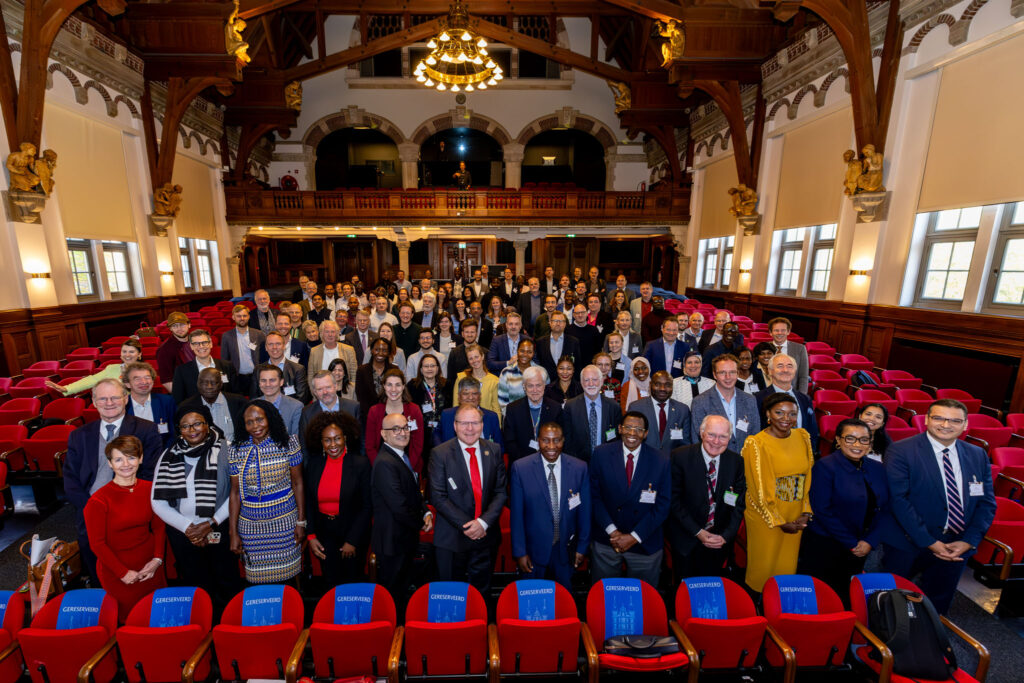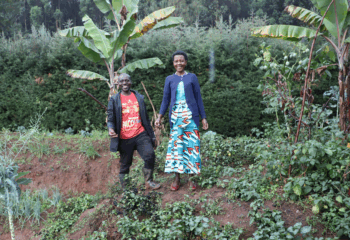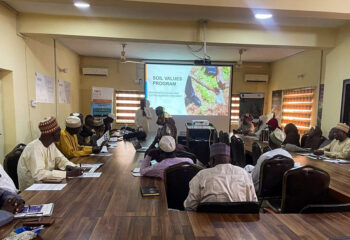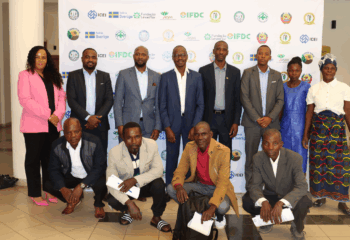
As a continuation of the organization’s first symposium this year in Washington, D.C., to commemorate the center’s 50th anniversary, the International Fertilizer Development Center (IFDC) hosted a second symposium, “Future Proofing: Unified Action for Soil Health and Food Security,” on November 4 at KIT in Amsterdam.
The event brought together global agriculture experts, policymakers, leaders, and stakeholders to explore pathways for strengthening soil health and enhancing food security amidst a rapidly evolving landscape of environmental and economic challenges, in addition to the challenges of a growing population.
During the welcome address, IFDC President and CEO Henk van Duijn emphasized the center’s role in addressing food security as a global organization. He underscored the urgent need to prioritize soil health, nutrient efficiency, and access to fertilizers—especially in climate-vulnerable regions such as Africa—to boost food production and mitigate soil degradation, acknowledging the importance of addressing food security through collaborative efforts across continents.
Dr. Godfrey Bahiigwa, Director of Agriculture and Rural Development of the African Union Commission, outlined Africa’s broad strategy for transforming its agrifood systems over the next decade, aiming for food and nutrition security, millions of jobs for youth and women, and reduced reliance on food imports, which currently cost $50 billion annually. Instead, there should be a more balanced manner in trade to support job creation for local smallholder farmers and youth.
Dr. Bahiigwa highlighted the need for change, citing key statistics from the United Nations Food and Agriculture Organization (FAO), including the fact that 280 million Africans—around 20% of the population—face food insecurity.
“To achieve our goals, we must learn how to coordinate efficiently across ministries and agencies to strengthen implementation and deliver the desired outcomes for Africa.”
Dr. Godfrey Bahiigwa, Director of Agriculture and Rural Development of the African Union Commission
Concluding the opening address, Deputy Director-General of the Netherlands’ Ministry of Foreign Affairs Steven Collet acknowledged the pressing need for innovative partnerships to address persistent soil degradation and food insecurity, stressing the crucial role of collaborative efforts in advancing sustainable soil practices and scaling resilient food systems. Finishing his address, Collet highlighted the Dutch government’s continued support for international cooperation in these efforts.
The IFDC leadership panel of the Netherlands Symposium highlighted soil health as essential to tackling hunger, poverty, and climate resilience in Africa. Dr. Bahiigwa and Collet opened the session by stressing the urgent need for sustainable soil practices to secure food systems. Dr. Bahiigwa shared insights from the recent CAADP meeting, which assessed the progress of the Africa Fertilizer and Soil Health (AFSH) Action Plan. Urging bold commitments from African governments and their partners, he emphasized that African-led implementation, better coordination among stakeholders, and enhanced fertilizer production are key to the success of the AFSH Action Plan.
Panelists discussed how their countries are approaching soil health through tailored solutions. Collet explained the Netherlands’ emphasis on local adaptation over “blueprint” approaches, pointing to the Soil Values program in West Africa, which collaborates with farmers to strengthen soil management. Caroline Kitana Chipeta, Tanzania’s ambassador to the Netherlands, described her government’s efforts in soil testing, farmer training, and partnerships with organizations such as IFDC to boost smallholder productivity. Paul Gulleik Larsen of the Norwegian Ministry of Foreign Affairs highlighted Norway’s financial support for the AFSH Action Plan and the importance of climate finance for smallholder farmers adopting sustainable practices.
The panel concluded with a call to strengthen international partnerships and align technical and financial resources with Africa’s soil health goals. Dr. Bahiigwa emphasized partnerships between African countries and global allies, while Collet underscored the role of female farmers in soil health initiatives. Chipeta advocated for youth and gender inclusion, and Larsen reiterated the need for African-led solutions to address climate change and food security challenges. The panel’s consensus was clear: achieving food security through sustainable soil health requires committed, cross-sector collaboration at a global scale.
The next panel, “Transforming Food Systems: The Answer Lies Beneath Our Feet,” was moderated by IFDC’s Vice President of Programs Dr. Oumou Camara. Panelists, including Dr. Andre Bationo, Dr. Anneke Trux, Nico Janssen, Josephine Okot, Dr. Richard Rugendo, Mehdi Filali, and Ivo Demmers, discussed how soil health is integral to sustainable food systems and food security in Africa. The discussion emphasized that soil degradation costs African farms about $84 billion annually, illustrating the urgency of supporting soil health initiatives to improve food and nutrition outcomes.
Panelists shared solutions to counter soil degradation and food insecurity. Demmers advocated for locally adapted, community-driven solutions, which he believes can make external funding more effective. Dr. Trux presented her work conducted in Ethiopia, where soil liming to reduce acidity showed immediate positive effects, demonstrating the value of accessible, short-term solutions in catalyzing larger agricultural transformations. Similarly, Dr. Rugendo highlighted the need for investment in seed development, storage, and mechanization to prevent food loss and improve agricultural efficiency.
Filali praised IFDC’s SOILS-Space to Place program for delivering tailored fertilizer recommendations to farmers and recognized the AFSH Action Plan as a catalyst for partnerships and collaboration. Janssen stressed the value of simplicity in agricultural innovation, using demonstration plots to clarify new methods and debunk misconceptions about innovation. The panel collectively underscored that straightforward, accessible innovations are crucial for scaling soil health initiatives, thus supporting sustainable agricultural productivity and food security across Africa.
After a lunch break, symposium attendees broke into five working groups: Producers and Consumers, Private Sector, Government and Enabling Environment, Research and Innovation, and Financial Sector. Each group explored actions to remove barriers to food security within the food system, with a particular focus on how African nations can sustainably produce enough nutritious food to feed its communities while restoring soil health.
The plenary that followed, moderated by Dr. Leigh Winowiecki, brought the working group leaders together onstage to explore breakout session discussions.
Watch the video to learn more about how a transformed food system built on trust, humility, inclusivity, partnerships, knowledge, and access can revolutionize food security, for Africa and the world.
Facilitator:
Dr. Leigh Winowiecki, Soil Systems Scientist; CIFOR-ICRAF Theme Leader, Soil and Land Health; Co-lead of the Coalition of Action for Soil Health (CA4SH); and IFDC board member.
Panelists:
- Rutger Groot, Stuart Morris, East-West Seed Knowledge Transfer (Producers and Consumers)
- Patrick Heffer, Deputy Director General and Chair of the Africa Forum, International Fertilizer Association (IFA) (Private Sector)
- Nico Janssen, Program Manager, Agricultural Livelihoods, IKEA Foundation (Government and Enabling Environment)
- Rejane Souza, Senior Vice President of Global Innovation, Yara Corporate Development (Research and Innovation)
- Sheila Keino, Executive Director, Sustain Africa (Financial Sector)
During closing remarks, both Dr. Rudy Rabbinge, former IFDC Chair and current Chair of the FAO World Agricultural Forum, and Neal Gutterson, IFDC Board Chair, emphasized the pivotal role of innovation, collaboration, and dedicated leadership in advancing IFDC’s mission in addressing the challenges of soil health, sustainable agriculture, and empowering smallholder farmers.
Dr. Rabbinge’s passion for fostering partnerships and his belief in the transformative power of agriculture were clear as he encouraged attendees to think beyond traditional approaches and embrace the integration of science and policy.
Reflecting on IFDC’s history, Gutterson recalled the organization’s visionary leaders such as former board members, including Norman E. Borlaug, and presidents and CEOs, including Amit Roy, reiterating the need for continued impactful leadership in innovation in agricultural research and development. As the newly appointed Board Chair, Gutterson expressed his excitement about leading IFDC into its next phase and shared his vision for the future, with IFDC set to refresh its strategy for 2025 and beyond, ensuring its alignment with evolving global needs.
IFDC’s D.C. and Netherlands Symposiums set the stage for continued collaboration toward achieving global food security and advancing sustainable agriculture in line with the AFSH Action Plan. With active participant contributions, the event fostered a dynamic exchange of ideas and solutions and laid a robust groundwork for transformative solutions toward a sustainable, food-secure planet.



